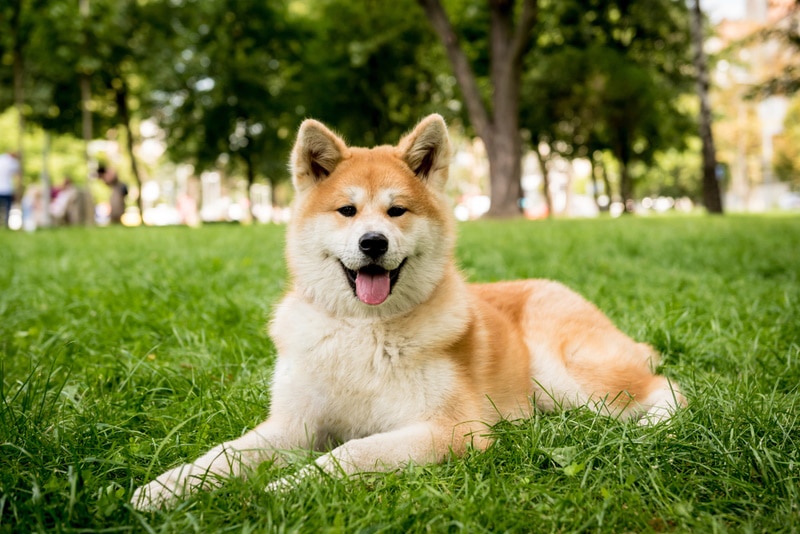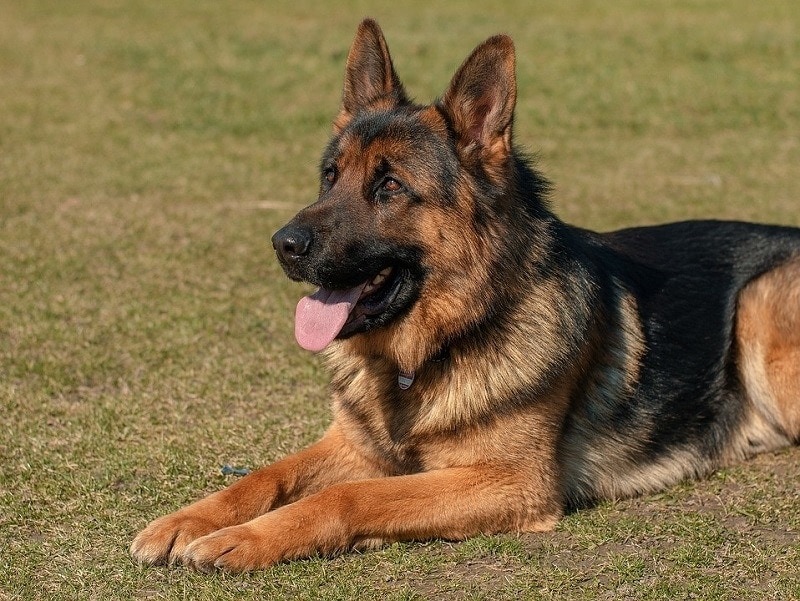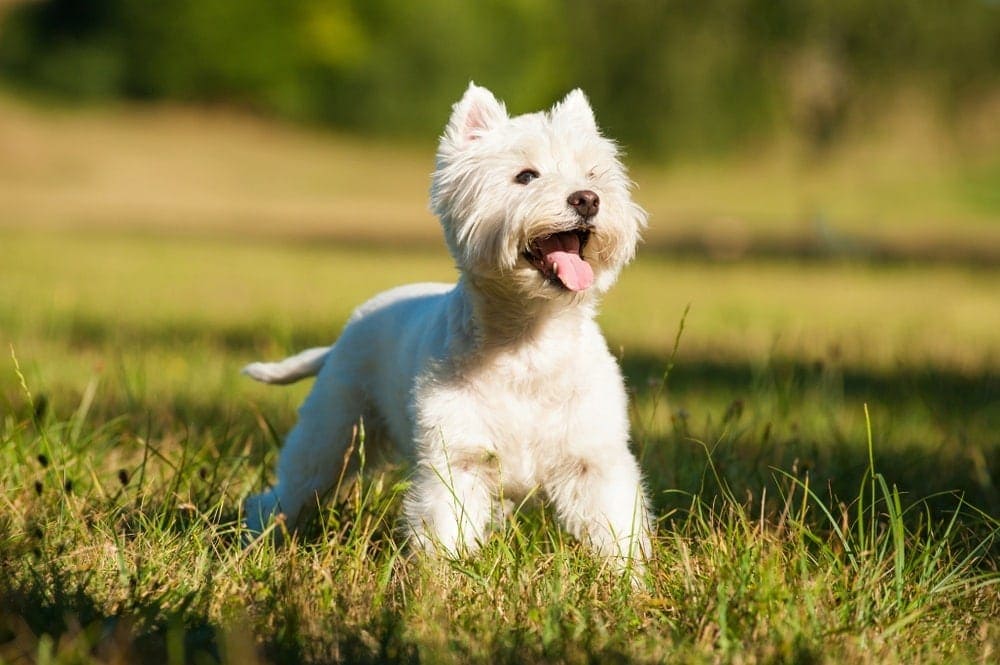Dorgi vs Corgi: Main Differences (With Pictures)

Updated on
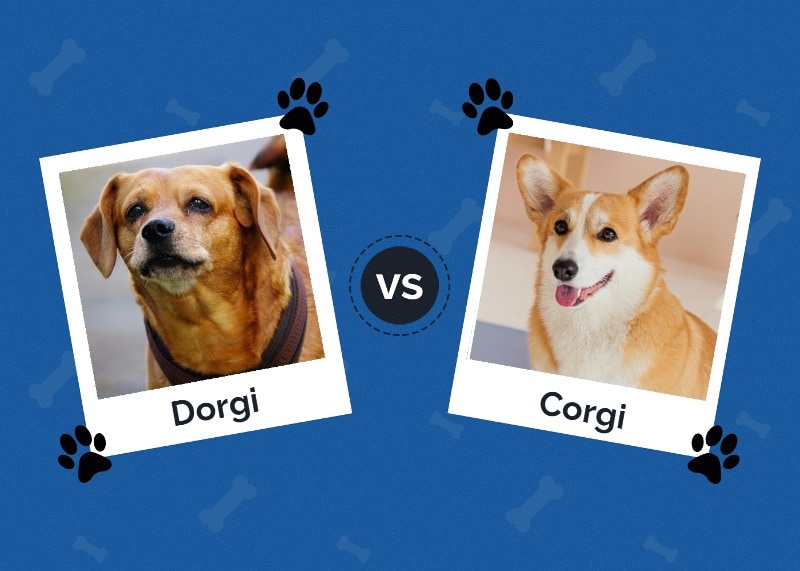
Click to Skip Ahead
Corgis and Dorgis are two of the most beloved breeds of dogs in the world. Both breeds have their own unique characteristics and personalities, making them both great companions for any family. Corgis are known for their intelligence, loyalty, and eagerness to please, while Dorgis are known for their playful nature and stubbornness.
Both breeds require regular exercise and grooming, but they differ in size and lifespan. So, which one is right for you? Let’s look at the differences between Corgis and Dorgis to help you decide which breed is best for your family.
Visual Differences

At a Glance
- Average height (adult): 9–12 inches
- Average weight (adult): 15–28 pounds
- Lifespan: 12–15 years
- Exercise: 1+ hours a day
- Grooming needs: Mild
- Family-friendly: Yes
- Other pet-friendly: Often
- Trainability: Intelligent and loyal
- Average height (adult): 10–12 inches
- Average weight (adult): 27–30 pounds
- Lifespan: 12–13 years
- Exercise: 1+ hours a day
- Grooming needs: Moderate
- Family-friendly: Yes
- Other pet-friendly: Often
- Trainability: Highly intelligent, needs advanced training
Dorgi Overview

Dorgis are a hybrid breed of dog that is a mix between a Dachshund and a Corgi. Just like Corgis, they have short legs and long bodies, but they tend to be a bit smaller due to the mix from the Dachshund. They also come in a variety of colors, but their coats tend to be a bit wispier and more delicate as opposed to the Corgis’ ruddier short-haired looks.
Because they are a strong mix between two breeds and not purebred, Dorgis can have a wide variety of appearances. Corgis tend to have a more consistent look overall. Dorgis are not recognized by the American Kennel Club because they are not purebred but hybrids.
Personality / Character
Dorgis are known for being smart, energetic, and for loving human interaction. Because they are bred from two lines (one of herding dogs and one of hunting dogs), they need to feel they have a purpose and something to do. They are active dogs that require regular exercise and mental stimulation to stay healthy and happy. They are great as apartment dogs as long as you make sure they have plenty of opportunities to move around, stretch their legs, and play.
Dorgis were first bred in the early 2000s in the United Kingdom. They were created by crossing two popular breeds: the Dachshund and the Welsh Corgi. The breed has since become popular in other countries as well.
Training
Dorgis are intelligent dogs that can be trained easily with positive reinforcement methods. They respond best to consistent training and rewards for good behavior. It is important to start training early to ensure your Dorgi grows up to be well-behaved and obedient.
They need a lot of interaction and mental stimulation. If you give your Dorgi a sense of purpose, structure, and discipline they tend to be much happier overall.
Dorgis are known to be barkers and may not be good for homes with very young children or in living situations where this might not be appropriate.
Health & Care
Dorgis are generally healthy dogs, but they can be prone to certain health issues, such as back problems due to their long backs, as well as eye problems and skin allergies. It is important to keep your Dorgi at a healthy weight by providing them with regular exercise and a balanced diet. Regular vet checkups are also recommended to ensure your pet stays healthy.
Suitable for:
Dorgis are best suited for an experienced and patient dog owner who can provide plenty of exercise and interaction. Dorgis are a mix of two breeds, so it is important for owners to understand the behavior traits of both breeds to ensure they are providing the best care. They need plenty of exercise and playtime with other dogs, as well as a firm but loving hand when it comes to training.
Pembroke Welsh Corgi Overview
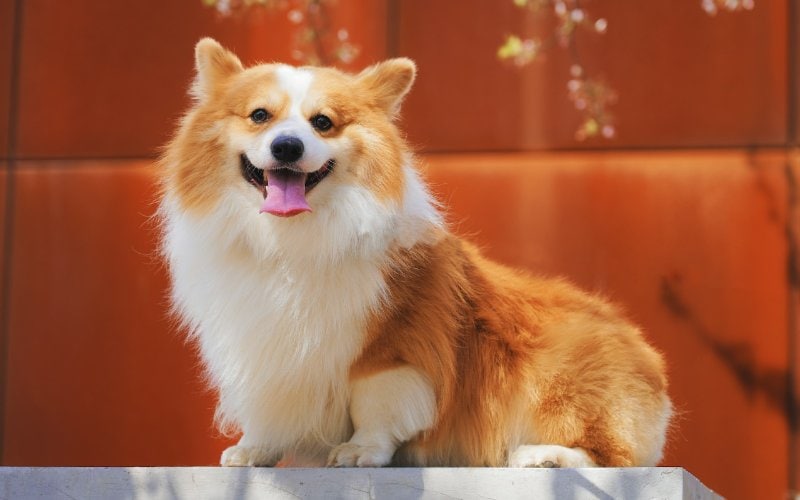
Corgis are a medium-sized breed of dog that originated in Wales. They are known for being smart, good family dogs, and eager to perform and show off. Corgis have a thick double coat that comes in a variety of colors, including red, sable, fawn, black, and tan. They have short legs and long bodies, giving them an iconic “stumpy” look.
Corgis are active dogs that require regular exercise and mental stimulation to stay healthy and happy. They are also very social animals that love spending time with their families.
Personality / Character
Corgis are intelligent dogs with outgoing personalities. They are loyal to their owners and eager to make them happy. Corgis can be mischievous at times, but they are generally well-behaved when properly trained. They love being around people and other animals, making them great family pets.
They are quite comical, especially with their “big dog in a small body” looks, and often elicit laughter and joy for their antics. They are curious and love to explore with their owners and see what the world has to offer.
Training
Corgis are highly trainable dogs due to their high intelligence. With consistent training and positive reinforcement, they can learn basic commands quickly. It is important to start training your Corgi as soon as possible so they can learn good habits from an early age.
Besides being show dogs Corgis are also trained for racing. This is not racing as you imagine it with slick greyhounds and a big track, but rather small-scale corgi races are often held as side events at horse shows wherein the corgis must make it through a track loaded with obstacles, such as jumps, and compete with each other to see who can complete the race first.

Health & Care
Corgis require regular grooming to keep their coats healthy and free of tangles or mats. They should be brushed at least once a week with a slicker brush or comb to remove any dirt or debris from their fur. Additionally, Corgis should be taken for regular vet checkups to ensure they stay healthy throughout their lives.
They can become overweight, so it is important to take extra care with their diet, as the additional weight will put a strain on their short legs. They are also prone to these conditions throughout their lives, elbow and hip dysplasia, eye disorders, heart issues, Von Willebrand’s disease, and Myelopathy.
Suitable for:
Corgis are best suited for an experienced and confident dog owner who is willing to provide consistent and firm training. They need plenty of exercise, mental stimulation, and positive reinforcement. Corgis are also known for their strong herding instinct, so owners should be prepared to provide ample space for them to play, as well as daily walks and plenty of playtime with other animals.
Interesting Facts: Dorgis vs Corgis
Perhaps the Corgis’ biggest claim to fame is their association with Queen Elizabeth II whose love for the breed is widely known. Her royal lineage of these stocky and cheerful pups has popularized the breed across mainstream culture. As herding dogs, they are good around livestock and horses and thus are favorites at country houses and on farms.
What people may not know is that the Queen also harbored a love of this new interloper, the Dorgi. Princess Margaret had a Dachshund called Pipkin, whom they bred with one of the Queen’s Corgis. The rest became history! The new hybrid was so popular the Queen added several more to the mix over the years. So, amongst her beloved pets at the end were a blend of Corgis and Dorgis, though the Dorgi not being a purebred has been less recognized in popular media.
Which Breed Is Right for You?
In all practical terms, the Corgi and the Dorgi are not far apart in temperament, personality, and intelligence. The primary difference is that Dorgis tend to be a bit smaller than Corgis and, therefore, easier to carry around and fit into small living spaces. They both need lots of activities and plenty of room to run and play. Dorgis also have a reputation for barking more so than Corgis, so if this is a concern, you should take it into account and speak to the breeder.
A big difference between the two breeds is the ability to participate in dog shows. The Corgi is a long-running and well-recognized show breed and, if you own one, you have the option to participate in dog shows. The Dorgi, on the other hand, is not recognized and, therefore, is not a show dog.
With either of these dogs, you will have a fun-loving, upbeat, and playful companion that will be beloved by the whole family.
Featured Image Credit: Dorgi (lukinIgor, Pixabay) | Right – Corgi (Antoni Shkraba, Pexels)



